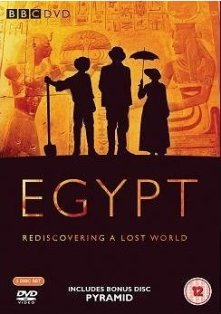Egypt (TV series)
| Egypt | |
|---|---|

BBC DVD cover
|
|
| Also known as | Egypt: Rediscovering A Lost World |
| Genre | Docudrama |
| Written by | Ferdinand Fairfax |
| Directed by |
|
| Starring | |
| Narrated by | Andrew Sachs |
| Composer(s) | Stanislas Syrewicz |
| Country of origin | United Kingdom |
| Original language(s) | English |
| No. of seasons | 1 |
| No. of episodes | 6 |
| Production | |
| Executive producer(s) | Philip Dolling |
| Producer(s) | Paul Bradshaw |
| Editor(s) |
|
| Running time | 60 minutes |
| Distributor | BBC |
| Release | |
| Original network | BBC One |
| Picture format | 16:9 576i |
| Audio format | Stereo |
| Original release | 30 October – 4 December 2005 |
| Chronology | |
| Related shows | Egyptian Journeys |
| External links | |
| Website | |
Egypt is a BBC television docudrama serial portraying events in the history of Egyptology from the 18th through early 20th centuries. It originally aired on Sunday nights at 9 pm on BBC1 in 2005. The first two episodes explored the work of Howard Carter and his archaeological quest in Egypt in the early part of the twentieth century. The next two episodes focused on the eccentric explorer "The Great Belzoni". played here by Matthew Kelly. The final two episodes dramatise the discovery and deciphering of the Rosetta Stone by Jean-François Champollion (Elliot Cowan).
The music was recorded by the Warsaw Radio Orchestra and is featured on the CD Timeless Histories by Chappell music, produced by Clare Isaacs.
The series was a major new docudrama series produced by the BBC for the Autumn 2005 schedule.
"The whole idea behind the series was to be able to discover Ancient Egypt through the eyes of Howard Carter – famous for uncovering the tomb of Tutankhamun; The Great Belzoni – an amazing adventurer and explorer; and the scholar Jean-François Champollion, who was the first to decipher the Rosetta Stone and open up the meaning of hieroglyphics."
In order to create a sense of "seeing the treasures of Ancient Egypt for the first time", Dolling and Bradshaw felt it essential to film at the actual archaeological sites referenced in the series.
"We had fantastic help from the Government and a local production crew, they managed to fix it for us to film in areas that, as far as we know, have never been used by other television or film productions."
"Being the first UK TV company to attempt such a project in the most amazing historical sights was very exhilarating, and to be able to return them - with additional sets and some computer imagery - to how they were during the time of the Pharaohs was incredible."
Filming at such invaluable and popular sites created new challenges for the film makers.
"Keeping people out of shot was one — sometimes this was nearing impossible — but we tended to shoot early in the day so disruptions were kept to a minimum. The other was obviously making sure we didn't damage anything, which thankfully we managed!"
...
Wikipedia
